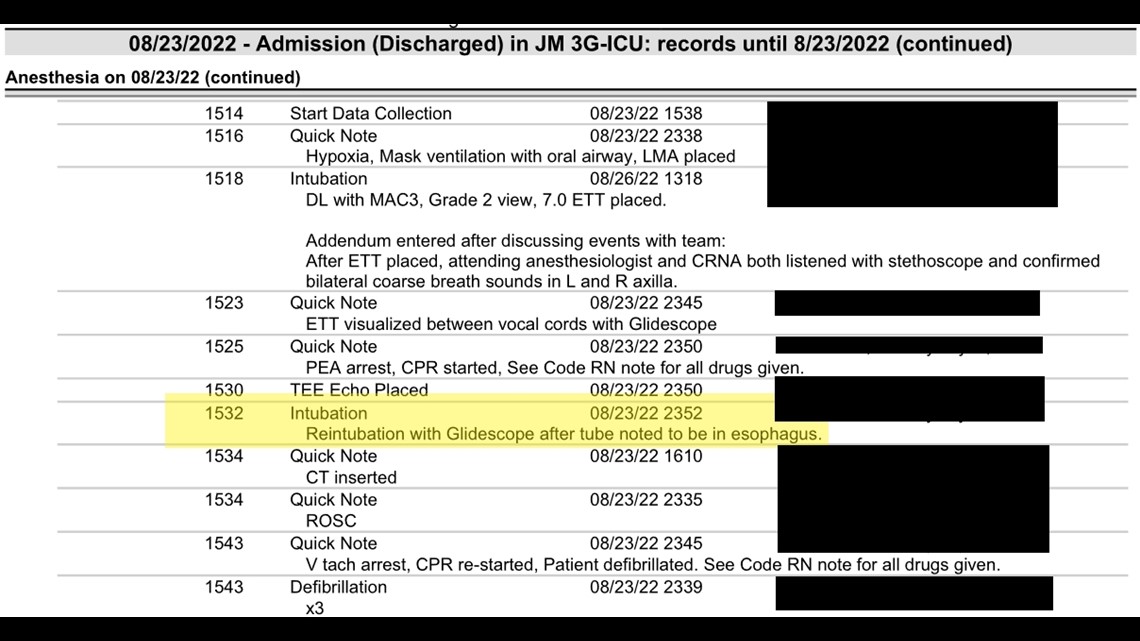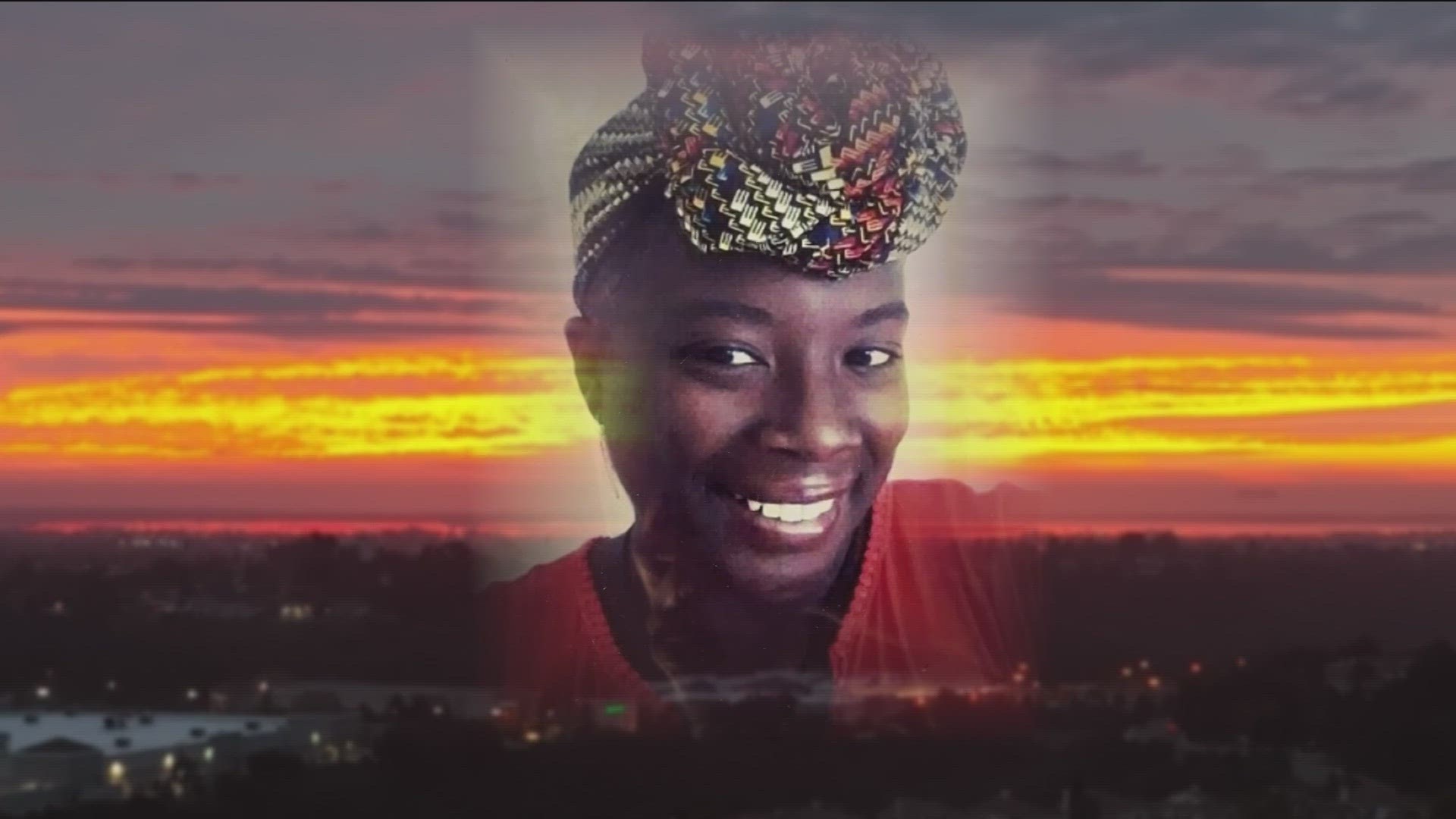SAN DIEGO — "I'm crying inside. Every day I cry inside," said Deane Tillett when describing the pain he has felt since his wife Latresia died during a routine surgery at UC San Diego Medical Center in August 2022.
"I stay strong because I know that I'm here for a purpose. I'm here to tell you what happened to Latresia," he said.
What happened to 39-year-old Latresia Tillett, a mother who overcame two separate bouts with cancer only to die during a routine breast enhancement surgery, is the focus of a new lawsuit against UC San Diego Medical Center and several doctors that, according to the complaint, made a fatal error on August 23, 2022.
The alleged mistake in the surgery room that day left Deane Tillett without his wife and high-school sweetheart, and a young boy without his mom.
"I remember kissing her on the head right before she fell asleep for the surgery," Tillett told CBS 8. "The doctor told me not to go far because it would be just a one-hour surgery, 'Your wife is gonna be going home today. When you leave here, I want you to take her on a date, go out to dinner,' that's what he told me that day," said Tillett.
Tillett says the idea of going to dinner after what was supposed to be Latresia’s final cancer operation to, according to the post-operative report, improve the aesthetic of her previous reverse mastectomy.
After all, Latresia had spent the prior five years in a desperate and painful fight with cancer. But after learning a year or so after having a mastectomy and later learning that she was cancer-free, Latresia decided to have breast reconstruction surgery. and ultimately the plastic surgery to enhance the look of her reconstructed breast.
"I told her that I didn't care about how she looked after her first surgery. I've known her since we were in high school. And I mean, there's love with us. There's nothing, nothing besides that. So, I didn't care. I was like, "I love you just like that. And then out of the blue. She's like, 'Hey, I think I'm gonna get the surgery.'" he said.
While at first, he opposed her getting another surgery, Tillett ultimately supported her decision.
The Surgery
On the morning of August 23, Deanne Tillett dropped off Latresia at UC San Diego Medical Center.
Medical records obtained by CBS 8 show that doctors administered anesthesia before intubating Latreisa at 1:20 pm. The surgery, according to medical records, was a success and staff removed Latresia’s breathing tube at 3:07 pm.
Minutes later, however, Latresia’s vocal cords began to spasm, preventing air from flowing into her lungs.
At 3:18 pm staff made the decision to reinsert the breathing tube so allow to get oxygen into Latresia’s lungs.
While a routine procedure, medical experts say intubations can be dangerous if breathing tubes are placed into a person's esophagus and not the trachea.
"I...[O]ne of the most dangerous [complications is] unrecognized esophageal intubation, which can result in anoxic brain injury, cardiac arrest, or death," reads a 2023 medical article in the Journal of the American College of Emergency Physicians.
According to the medical records, that is what happened to Latresia Tillett as staff unknowingly inserted the breathing tube into the esophagus which leads to the stomach and not the trachea at 3:18 pm.
At 3:25 pm medical staff found Latresia in the midst of a medical emergency.
However, it wasn’t until 3:30 pm, more than 12 minutes after staff placed the breathing tube down Latresia’s esophagus that they realized the error.


Medical staff placed Tillett on a ventilator and moved her into the ICU.
Around the same time, doctors called Deane Tillett to tell him the news.
“I remember rushing back to the hospital not knowing at all what was going on,” said Tillett. “They told me that Latresia was in the ICU so I went there and then they told me to go upstairs to an office. But at no time did somebody say that she had an accident.”
Tillett says it was the last thing he thought could happen. “I remember thinking that this is not what we expected. It's supposed to be the smallest surgery.”
Tillett says Latresia stayed in the ICU for days. Doctors told him that they were treating what was significant swelling in her brain.
Days later, as the swelling remained, a doctor approached him inside the ICU and told him the unthinkable.
“He said, and I remember this like it was yesterday, that ‘Hey, I'm gonna be honest, I'm going to tell you this Deane. Your wife is 100% brain dead.’ That's how I found out.”
When asked what his reaction was when hearing the news, Tillett pauses.
“I don’t talk about the reaction,” says Tillett. “It was a dark place. A dark reaction. I only remember trying my best to stay strong. I'm looking at everybody in my family breaking down. And I was just trying to stay strong.”
Part of staying strong, says Tillett, is seeking justice for Latresia, their son, and Latresia’s family and friends.
“I want justice plain and simple, justice,” says Tillett.
The Lawsuit
Attorney Amy Martel represents Tillett in his pursuit of justice. Martel, who specializes in medical malpractice and personal injury cases, says there were obvious mistakes made, the question is why it happened.
“It took over 10 minutes for the doctors to realize that she wasn't getting oxygen. And that's what we need to find out is why did it take so long? What isn’t a question is that the time spent without her getting oxygen ultimately led to her death,” says Martel.
But it’s Tillett’s story that Martel says stands out most. “It is heart-wrenching,” says Martel. “This woman beat breast cancer. She took her family and herself through that chemotherapy, radiation surgery battle and she won. Now she's going back to feeling like a full woman again. And she goes back for this final one-hour surgery and her life is over her child now doesn't have a mom. It is heartbreaking.”
Another heartbreaking part, says Martel, is that despite what she found were obvious mistakes made that led to Tillett’s death, current state laws limit the amount in general damages that hospitals and doctors have to pay in medical malpractice cases.
“Now, we can't bring Latresia back, but the best we can do in the civil system is to compensate [Tillett] and his family,” says Martel. “The laws in this state limit the amount of money that a family can recover.”
Martel says that up until this year, the cap in malpractice lawsuits in California was $250,000 and this year it was increased to $500,000 for pain and suffering.
“Far too many people have been under-compensated for decades,” adds Martel. “It is devastating to think that this husband and this child will not be given the justice they deserve.”
For Tillett, he has yet to recover so many other things left by the absence of Latresia.
“My laugh is not a laugh, my laugh is just a smile,” says Tillett. “I don't even know what a laugh is anymore. I do know that Latresia was a white tiger, the rarest of breeds. That spirit is still inside me and I’m a better person for it.”
A spokesperson for UC San Diego declined to comment due to pending litigation.

